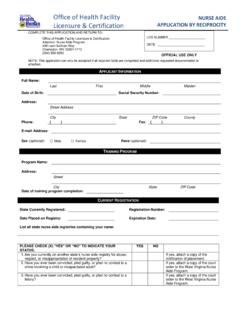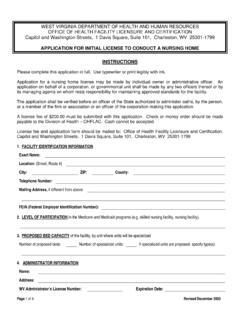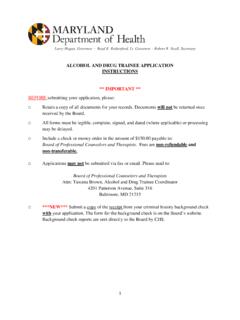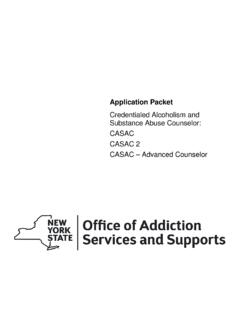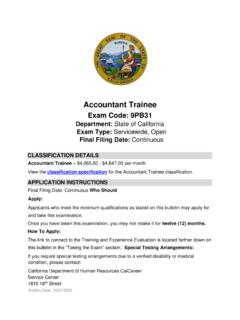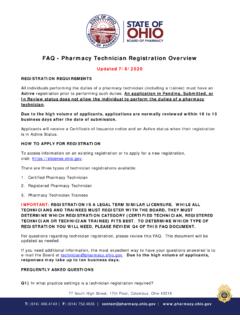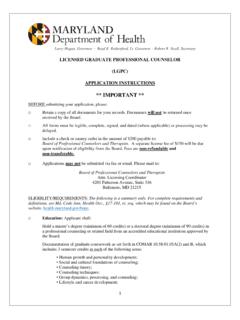Transcription of AMAP Training Guide - West Virginia Department of Health ...
1 Office of Health Facility Licensure and Certification EFFECTIVE | MARCH 17, 2016 AMAP Training Guide BOOK 2 trainee Book 1 trainee Handout AMAP Scope and Limitations 1. All medications administered by qualified personnel must be administered in accordance with prescribed orders, facility policy, and all applicable Federal and State laws and regulations. Administration of medications may be delegated to non-licensed staff in approved facilities. Medication Administration is assisting a person in the ingestion, application or inhalation of medications, including both perscription and non-perscription drugs or using universal precautions for rectal or vaginal insertion of medication according to the printed directions by a physician or other authorized Health care practitioner.
2 Delegation is the handing over of a task to another person, usually a subordinate. It is the assignment of authority and responsibility to another person to carry out specific activities or functions. 2. Facilities/entities approved for inclusion in this program: ICF/MR (intermediate care facility for people with mental retardation) Assisted Living Residences (ALR) formerly called Personal Care or Residential Board and Care Homes Behavioral Health Group Homes Private residence in which Health care services are provided under the supervision of a registered nurse (RN) 3.
3 There are various routes by which an Approved Medication assistive Personnel (AMAP) is permitted by law to administer medications. The proper route for administration must be specified in the physicians order. If the AMAP is administering medications and the route is not specified on the Medication Administration Record (MAR) or order, she should immediately notify the RN. The RN is responsible for clarification of the physician order and correct transcription onto the medication record.
4 Oral: swallowed by mouth Sublingual: dissolved under the tongue Buccal: related to the cheek or mouth Topical: applied to the skin Eye (ophthalmic): drops or ointments inserted/applied to the eye Ear (otic): drops placed in the ear Nasal: placed in the nose/nostril Rectal: inserted into the rectum Vaginal: inserted into the vagina Inhalant: taken in through the mouth or nose by breathing in or inhaling Trans-dermal: absorbed through the skin through application of a patch trainee Book 2 4.
5 The following may NOT be delegated to an AMAP: Injections Any parenteral (instilled into body tissue) medications Irrigations or debriding agents used in the treatment of skin conditions or minor abrasions Wound care An AMAP cannot transcribe a new physician order on the MAR. 5. To be eligible for Training and testing to become an AMAP and to administer medications in a facility, you must: have a high school diploma or GED not be listed on the State Nurse Aide Abuse Registry have not been convicted of crimes against persons or drug related crimes as evidenced by a criminal background check be able to read, write and understand English be certified in CPR and First Aide (and maintain certification)
6 Participate in the Training program approved by the state and provided by a RN who has completed the Department approved RN orientation course pass the competency exam after the Training program be monitored and supervised by a registered nurse participate in a retraining program from an RN every two years 6. The AMAP approved RN is responsible for monitoring all AMAPs authorized to administer medications. The RN must be available to the AMAP twenty-four (24) hours a day and respond to questions or concerns.
7 The RN must ensure that a file is maintained on each AMAP verifying that they have met all eligibility requirements. The file must include a copy of their certificate for passing the test. It must also include all quarterly observations and two (2) year retraining documentation. Medication error reports and any additional Training should be made part of the AMAP file. The RN is responsible for this documentation. Note: The registered nurse may withdraw authorization for an AMAP if the nurse determines that you are not performing medication administration in accordance with the Training and written instructions or if the RN finds that you have falsified information to become an AMAP.
8 trainee Book 3 trainee Task Worksheet 1. Medication administration means: a. assisting a person in the ingestion, application, or inhalation of medications including prescription and non-prescription drugs b. assisting a person in the ingestion of special foods c. assisting a person in the ingestion illegal drugs d. all of the above 2. Delegation means: a. handing over a task b. the assignment of authority and responsibility to another person c. representing a licensed nurse d. a and b e.
9 All of the above 3. List the required qualifications to become an Approved Medication Assistive Personnel. _____ 4. Give an example of a situation where you would not administer medications:_____ 5. Who may withdraw AMAP privileges? _____ 6. Briefly describe the following routes of medication administration that are permitted under the code/rule: A. oral _____ B. ophthalmic _____ C. otic _____ D. inhalant/nebulizer _____ E. nasal _____ F. rectal _____ trainee Book 4 G. vaginal _____ H.
10 Topical/trans-dermal _____ I. sublingual _____ trainee Book 5 TASK Evaluations AMAP Scope and Limitations INSTRUCTOR S RATING SHEET Rate Each trainee Individually trainee Name: _____ Date: _____ Instructor Name: _____ THE trainee COMMENTS RATING 1. Able to verbalize clear understanding of definitions 2. Identified type of facilities where AMAPs can administer medications 3. Verbalizes eligibility requirements for individual to participate in AMAP program Identifies routes that AMAP may administer medications 5.
